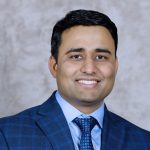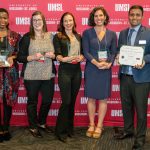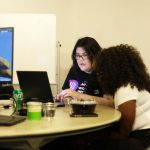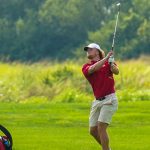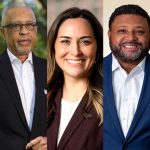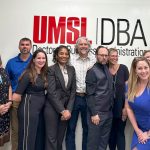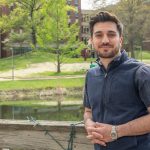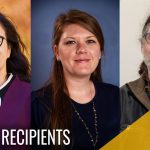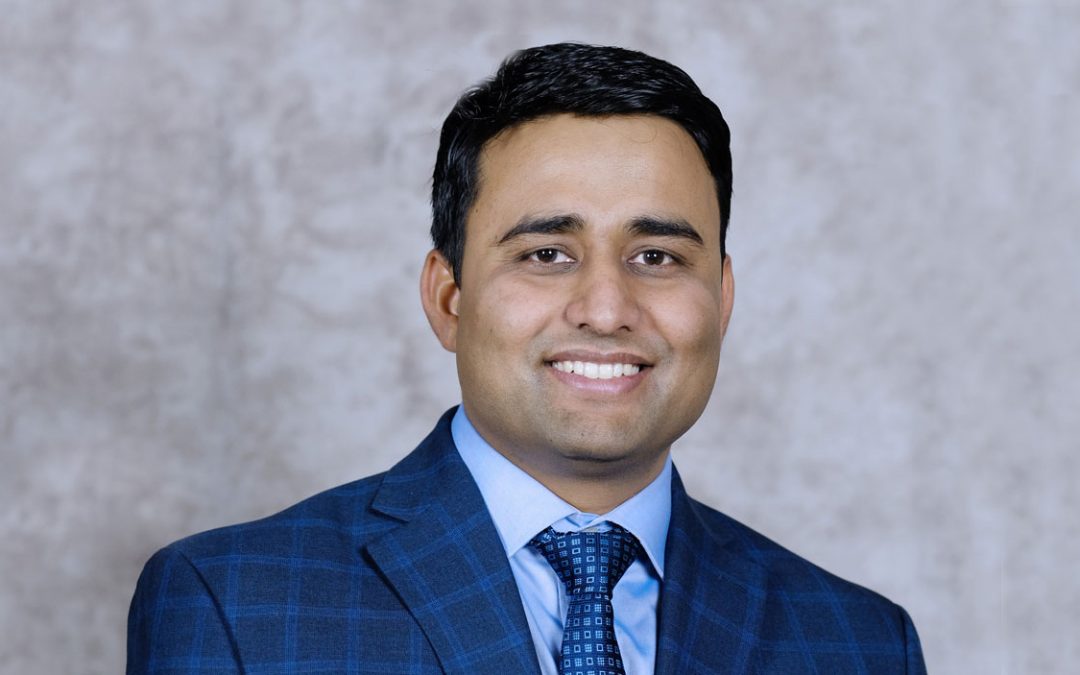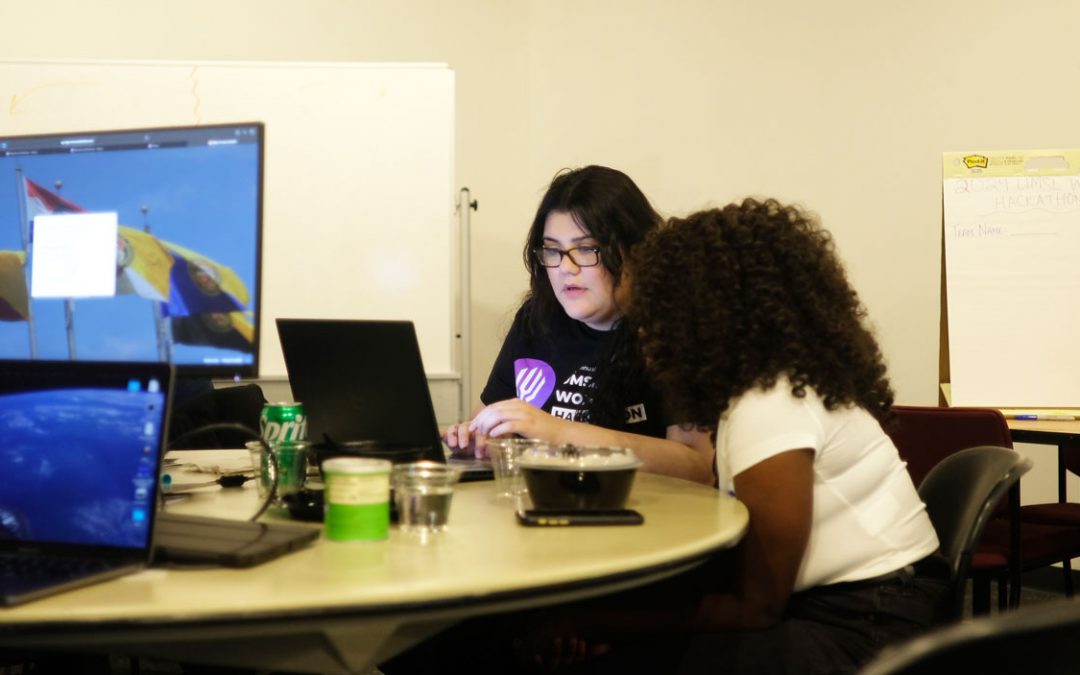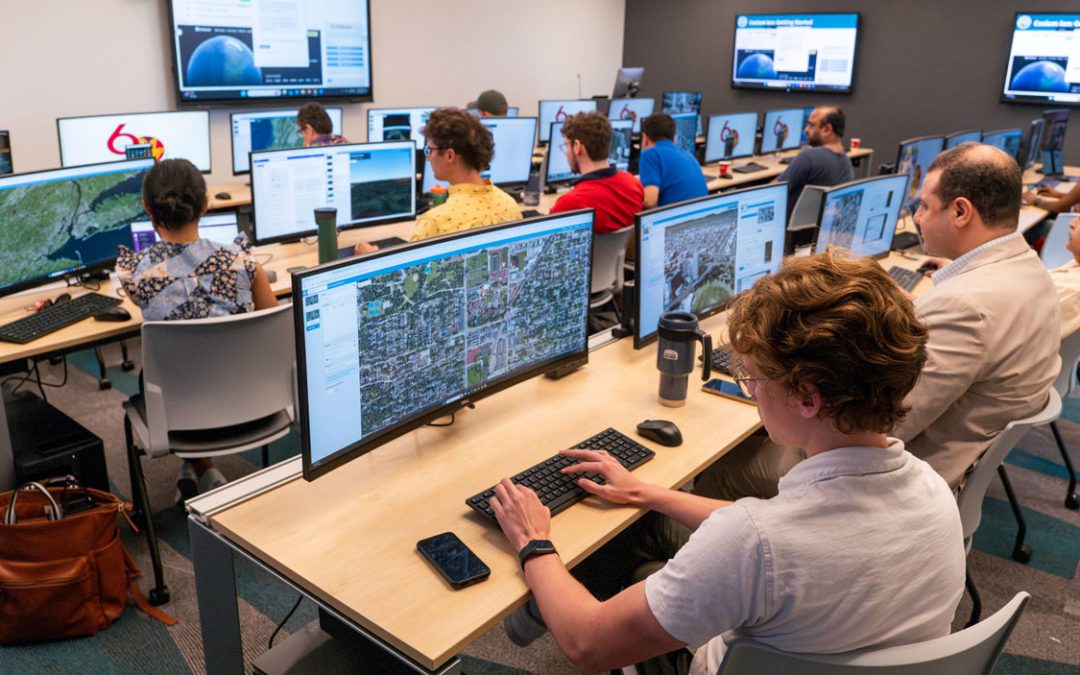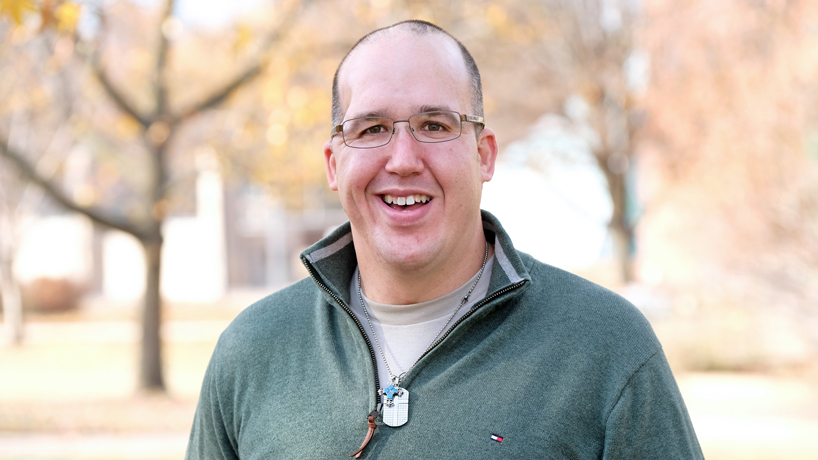
War and a severe injury interrupted Joshua Eckhoff’s student experience, but the graduating senior ultimately transitioned the circumstances into a source of strength. (Photo by August Jennewein)
Joshua Eckhoff has only brief memories of the day that would shape the rest of his life.
As usual, he woke up and set out in search of improvised explosive devices along the routes of Baghdad – a task he had encountered hundreds of times before without consequence. Eckhoff and his unit completed the mission, determined the area was clear and then, per standard operating procedure, followed the same path back to base.
From there, his recollections of the February 2008 morning are missing. But it may just be this lapse in memory that eases Eckhoff’s struggles with depression and post-traumatic stress disorder.
The path of discovery
On an unseasonably warm afternoon in late November, Eckhoff spent a portion of his walk across the University of Missouri–St. Louis’ North Campus reflecting on the IED detonation that resulted in a traumatic brain injury, which left him unable to talk, swallow or walk after three weeks in a medically induced coma.
This reflection then transitioned to a question he has frequently asked himself for nearly a decade: Why does his struggle with mental illness appear to be less severe than some of his friends and fellow service members?
The final course in his UMSL career has provided a bit of clarity.
“I have a number of friends that have been significantly impacted by post-traumatic stress, and I always wondered why I haven’t been so impacted by it,” he said. “I wanted to see if there was research out there about why it is that I haven’t been impacted as much as some of my friends. There is a lot of research that says because of the trauma I experienced I didn’t encode those same memories as other people might have.”
It is this inquiry and his military experiences that provide fuel for his academic ambitions in liberal studies, psychology and the Pierre Laclede Honors College.
The December graduate’s path to a degree and this final psychology course hasn’t been an easy one, nor has it been short. Eckhoff enrolled at UMSL in 2003 following his graduation from Parkway South High School in Manchester, Missouri. By that point, he had already enlisted in the Army – a commitment that required his mother’s signature due to age restrictions. Although the Army was his career of choice, Eckhoff was always a driven student, so he never questioned if he would simultaneously pursue higher education.
Within his first semester, Eckhoff was doing well, had an excellent schedule and developed a strong rapport with his academic adviser, Nancy Gleason. International deployment soon called, though, and he went to Gleason’s office to begin the paperwork for withdrawing from his classes – a process he would repeat twice more.
After his first tour, Eckhoff re-enrolled at UMSL only to be redirected later by a request to assist with Hurricane Katrina recovery efforts. Unlike his other deployments, the stateside emergency duty offered an opportunity to maintain portions of his academic schedule. But then came the second fateful tour in Iraq, which sent Eckhoff back overseas and into his role of searching for and disposing of IEDs.
The path of destruction
As Eckhoff’s team returned to camp on the day of his injury, two projectiles of an IED entered their armored vehicle. One instantly killed Eckhoff’s team leader and dear friend, Staff Sgt. Brad Skelton, and the other concaved Eckhoff’s Kevlar helmet and – as a result – the right hemisphere of his brain.
At that moment, Eckhoff’s team assumed he was dead. They rushed him back to Camp Liberty, where it was soon clear medics did not have the supplies to treat Eckhoff’s injuries. He was then medically evacuated to Balad, Iraq, where a surgical team removed a piece of Eckhoff’s skull, which allowed his brain to swell so as not to jeopardize his brain stem.
From there, Eckhoff transitioned to a hospital in Germany, then San Antonio and finally Minneapolis, where he came out of his coma weeks later.
It was in the hospital where Eckhoff learned the severity of his injury, the fate of his mentor and the news that he likely would not have the capabilities to complete his undergraduate degree. But it was also in the hospital where he began his road to recovery.
“For a long time after I was injured there was a lot of survivor’s guilt, and I blamed myself for Brad’s death,” Eckhoff recalls. “It took me a long time to get over that. But once I did, I was able to look at it and ask, ‘What would Brad want for me now?’ I know he would want me to improve myself as much as I can. He’s been a big part of my impetus for finishing school along with my family.”
The path to recovery
Today, Eckhoff has regained much of his cognitive functioning, the strength to walk unassisted and an ability to live independently. If you ask him how he did it, Eckhoff provides a modest but authentic answer.
“I can’t honestly say how I did it because I don’t know,” he replied. “When I look at where I am right now, there is no way I should be here. So I have to say there is a higher power involved in all of this, and there was a plan in my mind for where I was going to be in my life.”
While many mysteries remain about Eckhoff’s experience, he is certain about one aspect: this has not been a solo journey. He points to several key support systems for their efforts in assisting his recovery, but the main thread is quite clearly his mother.
“He has probably one of the most gifted mothers I have ever met,” Gleason said. “He’s very fortunate, and she’s very fortunate to have him. You can see how he became who he is because she is so giving and has been a center of his support.”
A selfless and giving soul, his mom, Jan, has provided a special brand of encouragement. Her abundant moral support has spilled into nearly every aspect of his life, including organizing her schedule to ensure her son always has a ride to campus.
Jan was also a key player in helping coordinate Eckhoff’s return to UMSL coursework, a process that started slowly and with a focus on writing. The skill was previously a strong suit, so it seemed like a logical place to start, especially if he hoped to complete his honors college certificate.
Gleason, now an associate dean emeritus in the honors college, created his first course back, an independent study section, which she hoped would ease his transition into college and civilian life.
Eckhoff was still in Minneapolis at the time, so she taught the course online and through a series of emails and phone calls. Knowing that his cognitive skills might be slower than his abilities pre-injury, Gleason centered the instruction on several books and articles that focused on writing effectively with a backdrop of patriotism and military service. This course, she says, is perhaps the most important step Eckhoff took as a student.
“Serving his country took bravery, but it took a lot of bravery to say, ‘I’m going to do this,’ and really have to learn some skills again,” she said. “It would have been easier if we would have signed him up for something where he could answer true and false tests, multiple choice and not have to manipulate his keyboard. But the honors college is all about writing, and that’s what he wanted to do.”
Since that reintroduction to college life, Eckhoff has completed one or two courses per semester. Along the way, he’s collected more honors credits than necessary to complete the certificate program.
“There is no way I could have returned to school without my involvement in the honors college,” Eckhoff said. “A lot of my education after my injury has been learning how I can work in this environment and be able to put the cognitive pieces together to be successful. A big part of that was being able to take a much reduced course load.”
The process has created an enduring bond between Gleason and Eckhoff – one they predict will last well beyond Eckhoff’s graduation next week. Eckhoff is quick to point to Gleason as one of the factors central to his student success. But Gleason insists she was simply just a mentor and, more importantly, a friend.
“This really has been a lot of years of complete devotion to a goal,” Gleason said. “It is difficult to know what is ahead for Josh because he has so much that he can share with other people.”
The path forward
Since returning to UMSL, Eckhoff has dedicated the majority of his time to studying as he says he has difficulty multitasking. But the structure of school, particularly the honors college, provided a safe space and an opportunity to focus on one objective at a time.
“It’s very important for me to have something to do and keep me engaged,” he said. “The goals that I’m able to set for myself academically have kept me on track in my own recovery. After I was injured, there were always very clearly defined clinical goals. First, I had to strengthen myself so I could walk again, and then eventually I had to further strengthen myself so that I could walk more correctly.”
With graduation in sight, Eckhoff’s goal will now transition to finding a rewarding job that will turn his trials and experiences into something positive – likely a position that assists other injured veterans with their recovery process.
“I wake up, and I see that I have these scars and there are still certain limitations that I have because of my injury, so I’m faced with it daily, but I wouldn’t say I really dwell on it anymore,” Eckhoff said. “When I do think about it, it’s a source of strength for me at this point.”
Media Coverage:
St. Louis Post Dispatch
St. Louis Public Radio
KSDK



